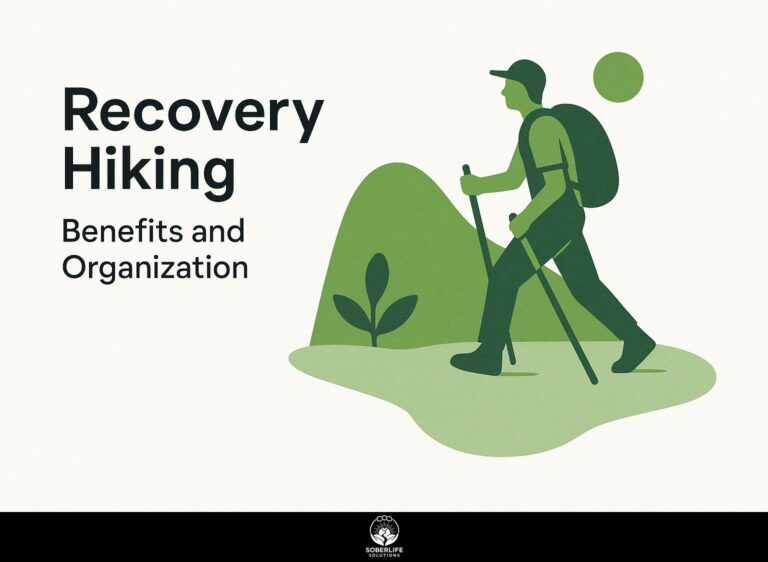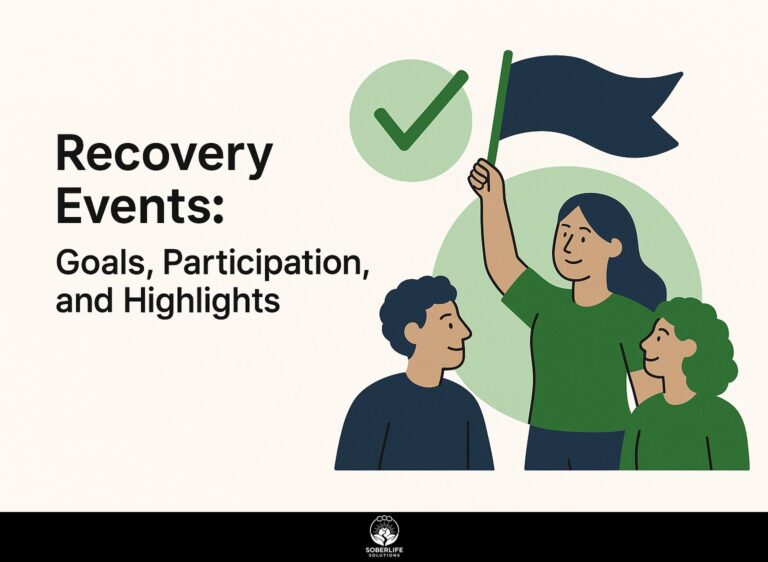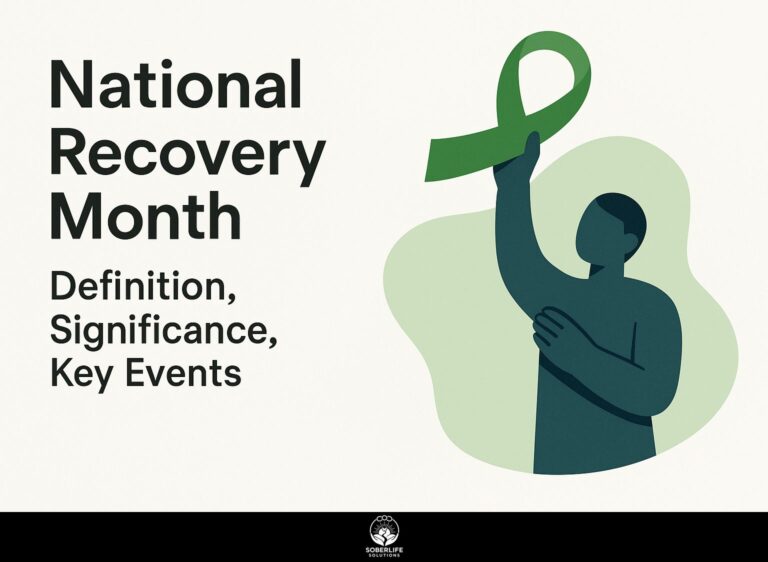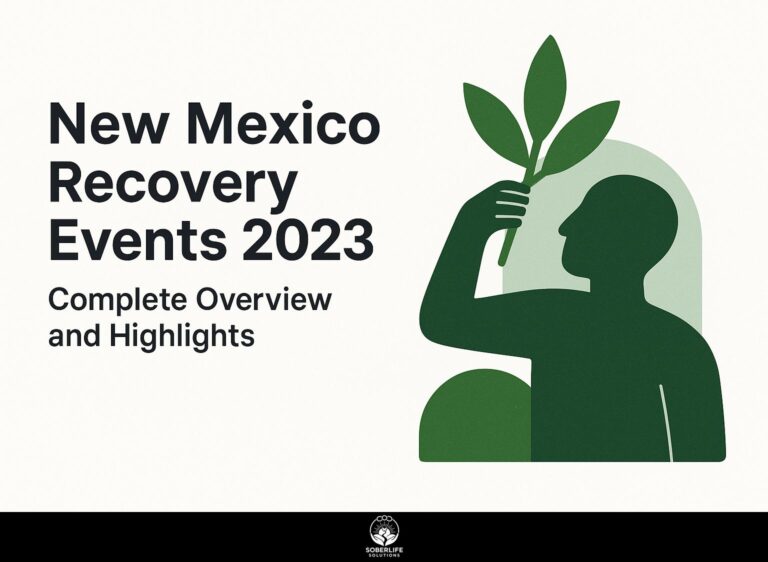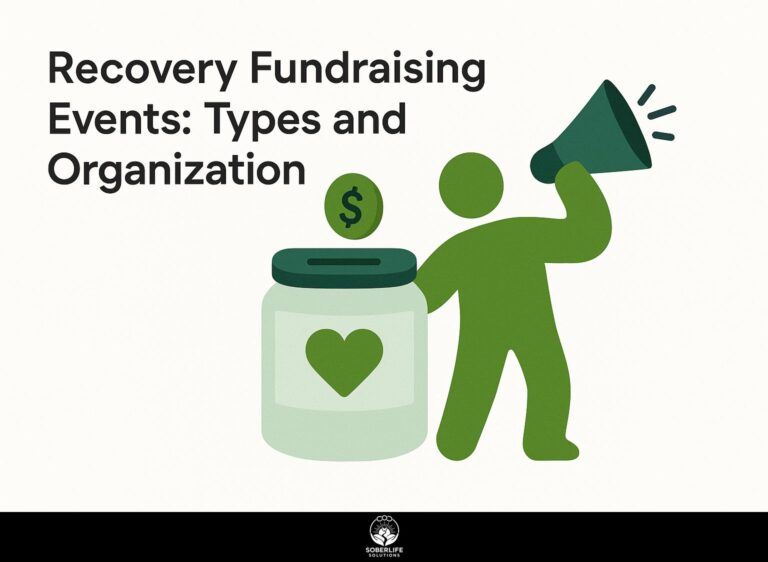Recovery Events 2023: Activities and Participation Guide
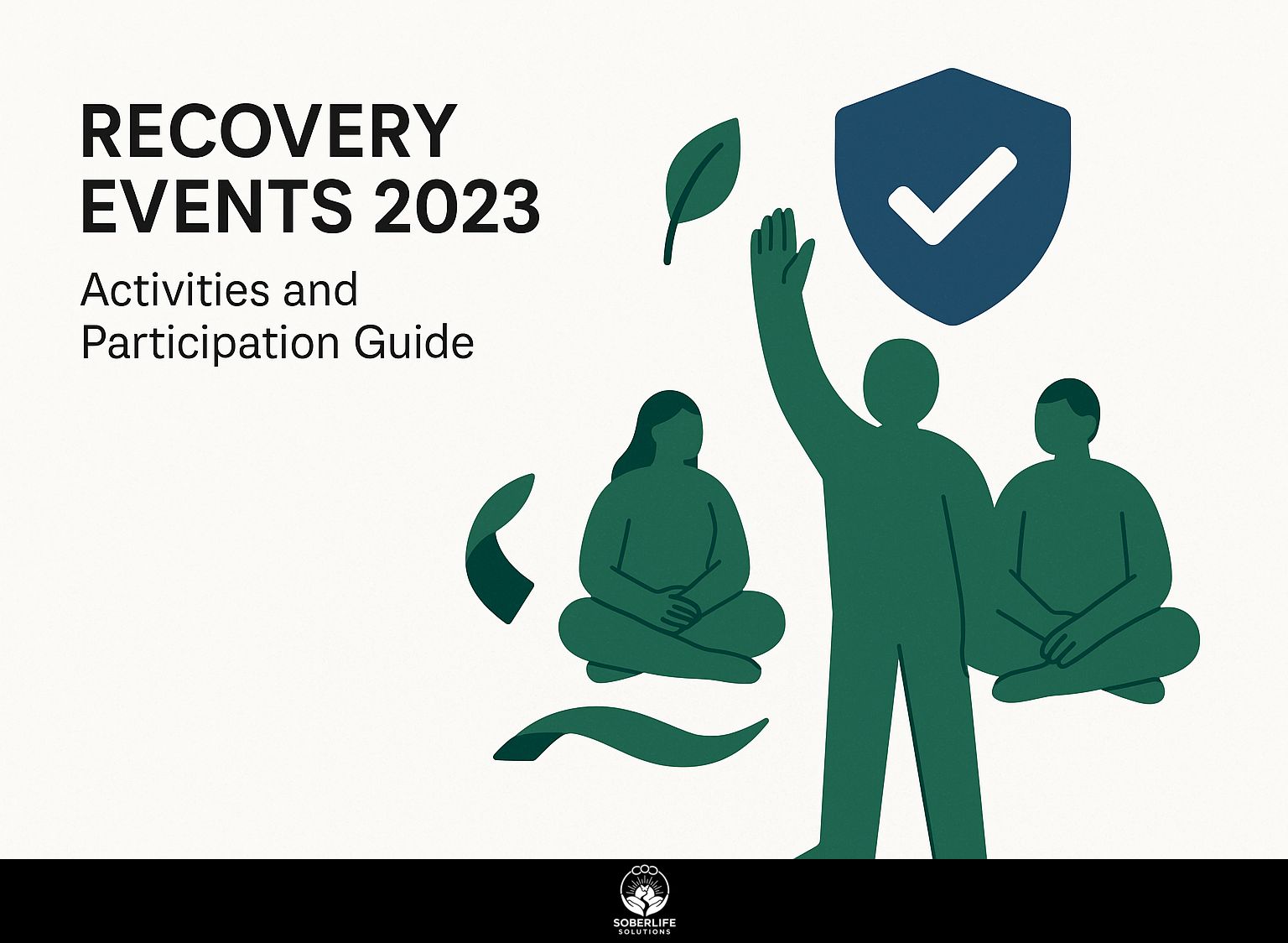
Introduction to Recovery Events 2023
In the spirit of National Recovery Month, 2023 offers a wealth of activities aimed at addiction recovery and mental health awareness. This detailed guide will help you find your way through recovery activities and support groups aimed at promoting healing and connection. Join us to learn about different events that help people in their recovery process, making sure you find the right chances to get involved and succeed in a friendly community.
Key Takeaways:
Purpose and Goals
Recovery Events 2023 offers a welcoming space for people in recovery, supporting strength and offering practical methods to address challenges for participants.
To achieve these goals, event organizers should focus on three main areas:
- raising awareness about recovery options,
- reducing stigma through open discussions,
- providing educational resources.
Local organizations, such as Faces & Voices of Recovery, can significantly contribute by organizing workshops and discussions. Activities like storytelling sessions, support groups, and resource fairs can give attendees confidence.
Working with mental health experts will improve the information given, making sure participants receive useful knowledge and feel part of a community. Industry experts, as well as insights from our discussion on National Recovery Month, emphasize the importance of combating mental health stigma through initiatives like these.
Target Audience
The target audience for Recovery Events 2023 includes individuals in recovery, their families, and community members who are passionate about promoting mental health and well-being.
These events focus on different groups of people, especially those dealing with opioid addiction, mental health issues, and different levels of support.
For instance, workshops can cater specifically to first responders and their families, while panel discussions may target peer support groups.
Mindfulness sessions bring together individuals from different recovery backgrounds, helping everyone feel included.
These events provide various activities that allow individuals to learn from one another and develop connections. This contributes to a welcoming and supportive environment for everyone involved in the recovery process.
Types of Recovery Events
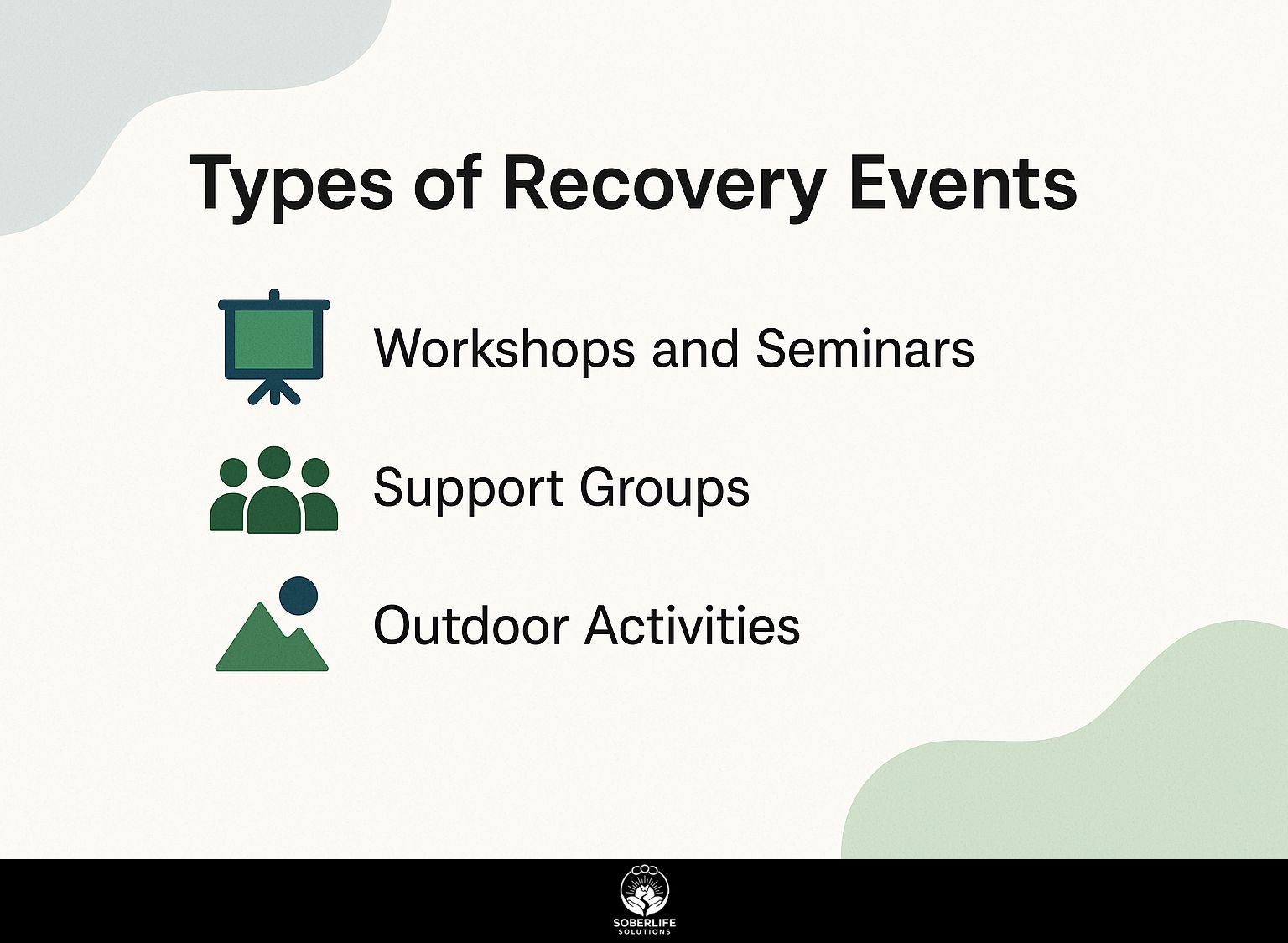
Recovery Events come in different styles, providing chances for people to participate, gain knowledge, and get support, all specific to different parts of the recovery process. For those interested in structured support systems, understanding the variety of Alcoholics Anonymous meeting types can offer valuable insights into how these meetings cater to diverse recovery needs.
Workshops and Seminars
Workshops and seminars provide essential education and skill development opportunities focusing on coping strategies and evidence-based treatment approaches.
Many helpful workshops can improve recovery processes.
For instance, ‘Mindfulness for Recovery’ emphasizes meditation techniques that reduce anxiety and improve focus. ‘Coping with Addiction’ offers practical tools for managing cravings and triggers, while ‘Relapse Prevention Strategies’ equips participants with strategies to maintain long-term sobriety.
Organizations such as SAMHSA often host these events, providing community support and expert facilitators. Furthermore, SAMHSA’s Evidence-Based Practices Resource Center serves as a valuable repository of information, enhancing attendees’ understanding of effective treatment strategies. Attending these workshops can lead to improved resilience, stronger support networks, and greater self-awareness in managing addiction challenges. Worth exploring: peer support groups that provide additional benefits and activities to complement these workshops.
Support Groups
Support groups are important because they offer a safe environment for people to share their experiences and build relationships with others dealing with similar issues.
Various types of support groups are available, including those led by peer recovery specialists and family support groups. According to SAMHSA, peer support workers play a crucial role in recovery, providing both emotional and practical support to individuals.
Groups such as Smart Recovery have assisted approximately 75% of individuals in maintaining long-term sobriety. On the other hand, family support groups, such as Al-Anon, focus on the loved ones of those struggling, enhancing their coping strategies and providing necessary resources.
Both kinds of support build community and awareness, which are important for recovery paths.
Outdoor Activities
Outdoor activities, such as fitness events and community service projects, promote physical health while also building social connections among participants.
Events like 5K runs test participants’ physical abilities and help build friendships as people train and compete together. Similarly, volunteer clean-up days can unite community members with a shared goal, enhancing both teamwork and environmental awareness.
Tools such as Meetup or Eventbrite can help coordinate these activities, ensuring that locals can easily find and join upcoming events. When people join these outdoor activities, they become healthier and form lasting friendships, which help with mental and emotional recovery.
How to Participate
Joining Recovery Events is easy. Just follow the basic steps to sign up and learn about any costs involved.
Registration Process
Most recovery events require participants to register online, typically through platforms like Eventbrite or local service organization websites.
To take part, visit the event’s official website and look for registration links and deadlines.
For example, if the event is in December, try to sign up at least six weeks earlier. Signing up early is important because it usually secures your place and may provide access to resources or materials before the event.
Consider signing up for newsletters from relevant organizations to stay informed about upcoming events and registration periods. This can improve your chances of joining well-attended events.
Fees and Costs
Participation fees for events can range from free community activities to more specialized workshops costing up to $150, often including materials and refreshments.
To handle these expenses well, think about asking local businesses to sponsor by putting together a package that explains what the event will offer them.
Also, look into raising money through sites like GoFundMe or Kickstarter. You can set a target amount and share what your event is about.
Getting involved with your community on social media can increase your visibility, promoting donations or help.
Applying for grants from local arts councils or nonprofit organizations can provide financial aid and reduce overall expenses.
Volunteer Opportunities
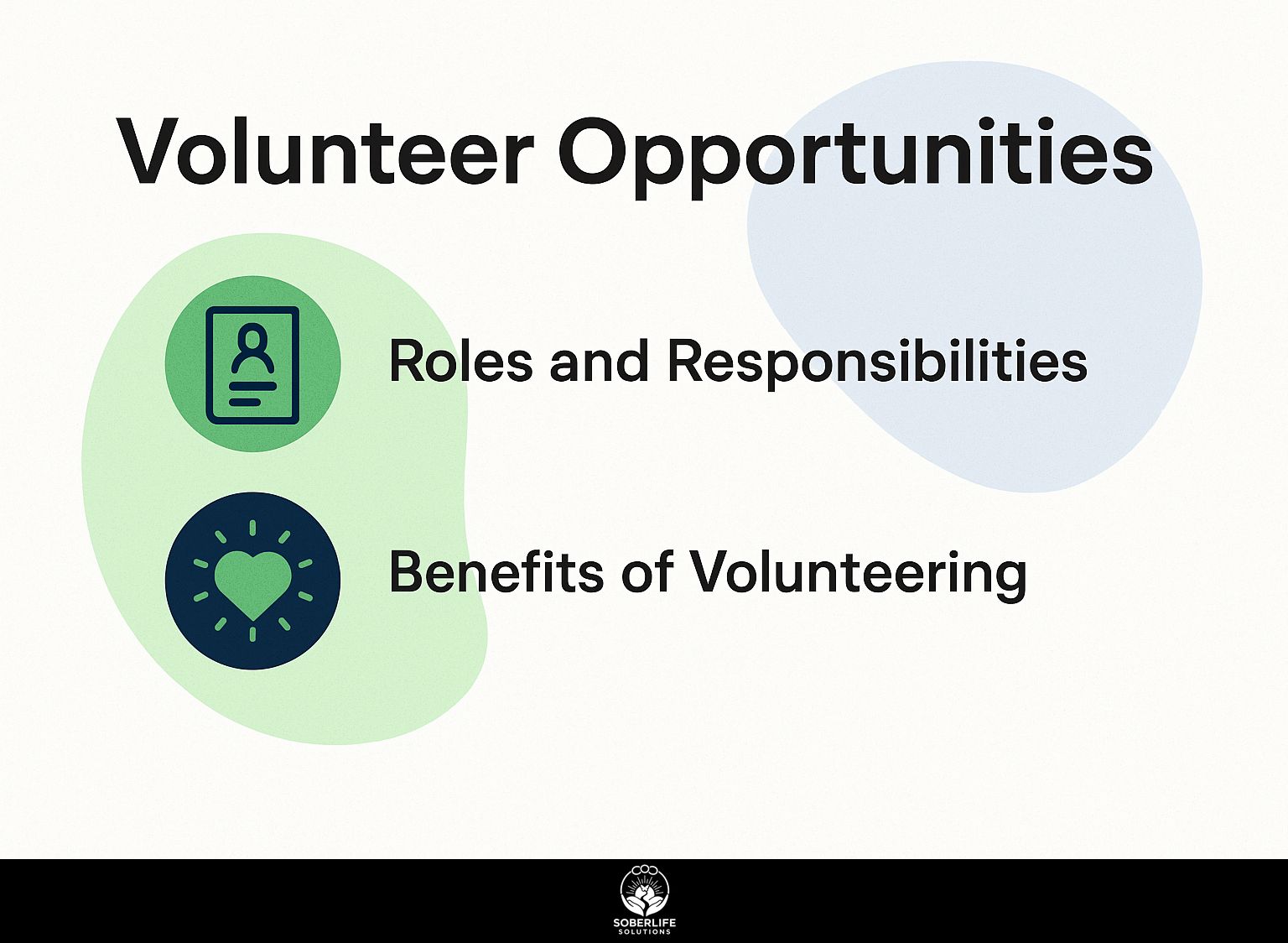
Helping out at Recovery Events benefits the community and offers meaningful experiences for those wanting to help with recovery. If you’re interested, you might explore how to actively participate in these events during Recovery Month.
Roles and Responsibilities
Volunteers typically take on roles such as event coordinators, facilitators, and outreach ambassadors, each playing a critical part in the success of recovery events.
Event coordinators usually commit to planning and executing logistics, dedicating about 5-10 hours per week leading up to the event.
Facilitators, often trained in peer support, may require specific skills in communication and empathy, volunteering 2-4 hours per event.
Outreach ambassadors focus on community engagement, attending local gatherings to spread awareness; they usually invest around 3-6 hours monthly.
Local groups such as SAMHSA often look for people to fill these volunteer positions. They offer training resources to help each volunteer work well.
Benefits of Volunteering
Volunteering helps the community and allows people to improve their leadership and teamwork skills.
By participating in volunteer work, people can meet and connect with experts in their area of interest, building relationships that might help them find job opportunities later.
Such experiences greatly improve one’s resume, showing dedication and practical use of skills. Volunteers gain firsthand experience in supporting recovery efforts, which helps them become more aware of the community’s needs.
Regular involvement allows people to grow personally and creates a helpful setting that aids both the volunteers and those they help.
Event Locations and Accessibility
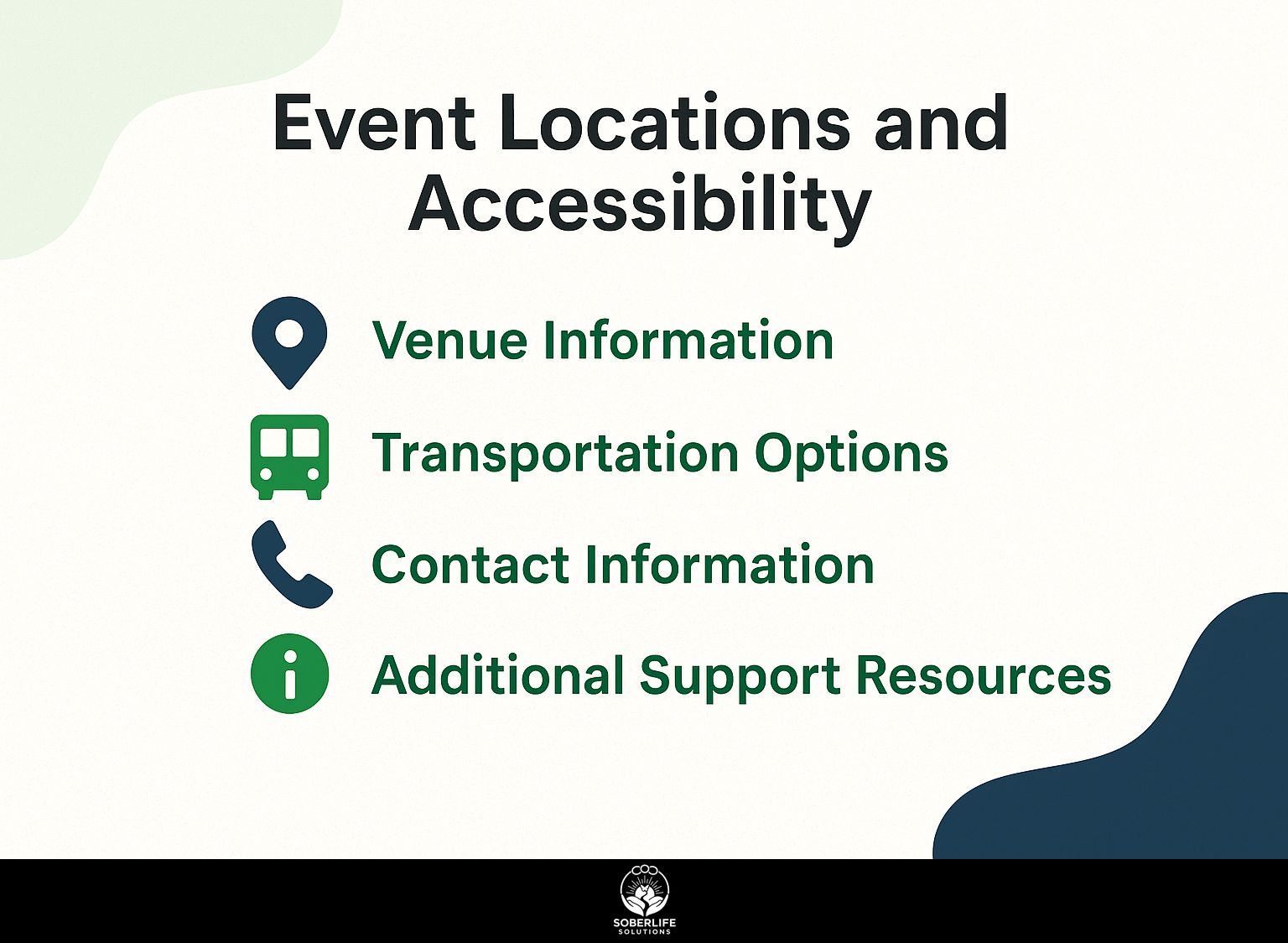
Choosing venues that are easy to get to is important to increase attendance at Recovery Events, allowing everyone in the community to fully participate.
Venue Information
Venues for Recovery Events can include community centers, parks, and treatment facilities, each equipped to accommodate diverse activities.
Community centers usually have rooms for different activities, kitchens, and outdoor areas. These make them great for classes and social events.
Parks provide fresh air and natural scenery, enhancing outdoor activities like yoga or group runs.
Treatment facilities may offer counseling spaces and support group rooms, ensuring a focused environment.
Working with local groups, like nonprofits focused on recovery and wellness groups, can make resources more available. This can include things like transportation services or volunteers to help set up events.
This collaborative approach maximizes the reach and effectiveness of recovery events.
Transportation Options
Accessible transportation options are essential for enabling participants to reach recovery events, including public transit and rideshare services.
Event planners can improve access by working with nearby transportation services. For instance, offering discounted rideshare options through services like Uber or Lyft can make travel more affordable.
Public transit systems often have specific routes that serve key event locations; for example, the Metro Bus service in major cities provides direct routes to community centers.
To keep participants informed, make a transportation guide with maps and schedules, and send it by email or post it on social media before the event.
Contact Information
To stay updated on Recovery Events, participants can connect with organizers through provided contact information on websites and social media platforms.
Local organizations are important in Recovery Month. For example, you can contact the National Council on Alcoholism and Drug Dependence at (800) 622-2255 or visit their Facebook page for updates.
Another helpful resource is the Substance Abuse and Mental Health Services Administration (SAMHSA). You can contact them at (877) 726-4727 or on Twitter at @SAMHSA.
Connecting with these organizations offers event details and opportunities for working together and receiving help in the recovery community.
Additional Support Resources
Additional help is important for people looking for assistance beyond events, such as online materials and nearby therapy options.
Think about calling the SAMHSA National Helpline at 1-800-662-HELP. They offer free and private support any time, day or night.
Local treatment centers can also be found through directories such as the Substance Abuse Treatment Facility Locator. Online platforms, like BetterHelp, offer affordable therapy options with licensed professionals.
The National Suicide Prevention Lifeline (1-800-273-TALK) connects individuals with trained crisis counselors.
Checking out local community resources, like support groups, can strengthen your support network. These groups offer a feeling of community and shared experiences.
Frequently Asked Questions
What is the Recovery Events 2023: Activities and Participation Guide?
The Recovery Events 2023: Activities and Participation Guide is a complete resource that describes the different activities and programs available for people recovering from mental health issues in 2023.
Who can benefit from the Recovery Events 2023: Activities and Participation Guide?
The guide is designed for anyone who is in recovery from a mental health disorder, whether it be anxiety, depression, PTSD, or any other condition. It is also helpful for family members and caregivers who are helping a loved one get better.
What types of activities are included in the Recovery Events 2023: Activities and Participation Guide?
The guide includes a wide range of activities such as support groups, workshops, art therapy, exercise classes, and educational seminars. There are options available for people, no matter what they like or can do.
Are there any costs associated with participating in the events listed in the Recovery Events 2023: Activities and Participation Guide?
While some events may have a small fee to cover materials or facility rental, the majority of the activities listed are free of charge. We think everyone should have resources and help for their recovery process.
Is there a specific timeline for these events in 2023?
The guide includes a general timeline for the events in 2023, but specific dates and times may vary. It is best to check with the individual event organizers for the most up-to-date information.
Can I contribute to the Recovery Events 2023: Activities and Participation Guide?
Yes, we welcome contributions from individuals and organizations who are hosting recovery events in 2023. Please contact us through our website to learn more about how you can get involved.

